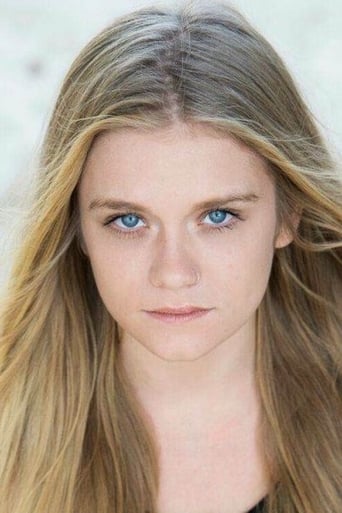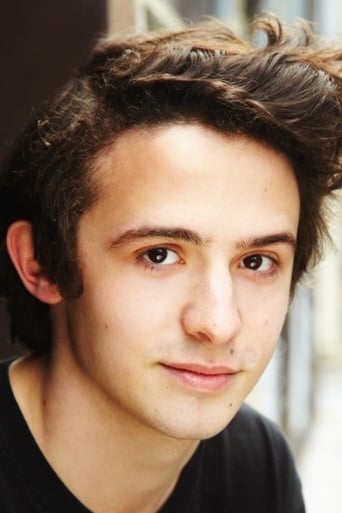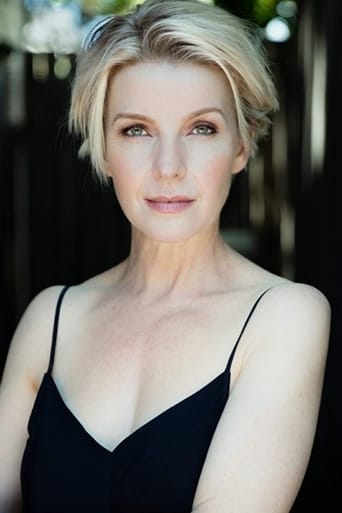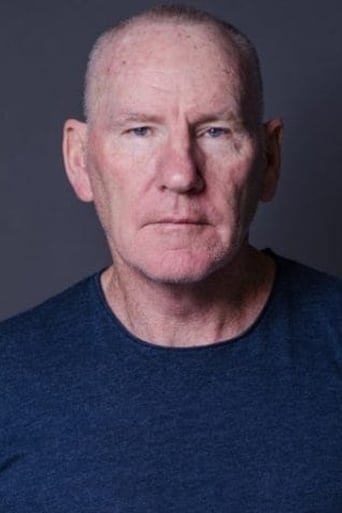Wordiezett
So much average
UnowPriceless
hyped garbage
Claysaba
Excellent, Without a doubt!!
Spoonatects
Am i the only one who thinks........Average?
TheBlueHairedLawyer
Most of the people I know here in Canada have never even heard of Opal Dream, A.K.A. Pobby and Dingan. One night while they were out watching another pathetic rerun of that disgusting Family Guy show, I went on eBay and bought a DVD of Opal Dream. When it arrived in the mail two weeks later it seemed to be a movie for little children, but as innocent as it seems, it's still got a quality to it that can be just as powerful for adults as for kids.Set in the great outback of Australia, Opal Dream is the story of the love between a little girl and her two best friends... whom no one else can see. Pobby and Dingan are imaginary friends, and very friendly and caring creatures. Her parents, teacher and brother try to understand Kellyanne's friendship by telling themselves that it's just a phase, that she'll grow out of it, that they're just emotional support for her since the family moved out to Coober Pedy for her dad's mining job, but one day they get fed up with her imaginary friends and force Kellyanne to lose them. In turn, they all learn just how powerful imagination can be, and the only one who seems to be able to finally try to set things right for Kellyanne is her brother Ashmol, and by the time the adults in town finally wake up and start seeing things from Kellyanne's point of view, it may already be too late.I'm not really sure of the theme of Opal Dream, or even if it has one. My best guess would be that it is trying to show how when a child, or anyone for that matter, loses something important to them, it can have irreversible effects. When it comes to imaginary friends, modern media has made them out to be monsters and signs of mental illness, from the 1978 horror movie Magic to the recent 2012 movie Imaginary friend. It's rather unfortunate that today anyone who has an imaginary friend is viewed as having some sort of trouble, because for some people an imaginary friend is their support, their coping mechanism and the only one they can trust. Believe it or not many adults have them, and these people are still normal, happy members of society. Kellyanne's parents were worried that their daughter was getting to old for her unseen companions. They got their peace of mind, but Kellyanne got cheated out of her childhood.This movie is surprisingly sad for a children's movie, I won't ruin what happens at the ending but it's incredibly depressing and will leave a lasting memory, that's for sure. The Australian scenery is very beautiful and the acting was excellent. I liked the soundtrack and the whole movie had vague elements of Paperhouse (1988) and Don't Look Under the Bed (1999). Sadly most kids today only want to watch cr*p like The Hunger Games and Disney's Frozen, so it's nice to see that there are still good movies out there for kids if you know where to look. My little brother loved this one too, but because of the ending of the film, you may want to watch t yourself before showing it to your kids. I think it deserves a 10/10 stars, even more than that, it's a beautiful movie with a timeless message and will definitely be one of my favorites for a long time to come.
nevadaluke
Screened on DVD June 8, 2008It's a warm holiday season in the South Australia mining town of Coober Pedy, and for the Williamson family, festivities are juggled around nine-year-old Kellyanne's devotion to her invisible playmates, Pobby and Dingan, and her dad, Rex's, single-minded pursuit of the perfect opal.The hypnotic gems possess a dangerous allure, as the girl's brother, Ashmol, says in his framing narration to "Opal Dream." Everybody comes to the place to dream -- presumably about a better life somewhere -- as they dig for opals. The more you dream, the deeper you want to dig, but if you dig too deep, you might never get out -- never wake up, he says.For the Williamsons, the town offers dreams and not much else. Rex hopes to strike it rich for his wife, Annie, and their kids. But after a year in town, they don't have much. Rex needs a bit of luck at the races to afford the kids' Christmas presents.Moving to Coober Pedy has taken the hardest toll on Kellyanne, for whom Pobby and Dingan are two very real people, and she shares with everyone her enthusiasm for her friends' artistic, gentle, natures. "They're pacifists," she explains.Her teacher says Kellyanne has a vivid imagination but she's a dreamer who doesn't have many friends -- "she doesn't find people very easy." When Rex complains about Pobby and Dingan, Annie points out that they're as real as opals are to him.Rex has his share of more tangible problems. He has relocated after an apparently minor brush with the law, and he finds himself in a community of narrow-minded ruffians who don't coddle to "ratters" -- blokes that come around at night and noodle around your claim for highly prized colored opals.Adapted from a Ben Rice novel, "Pobby and Dingan," the movie "Opal Dream" is the story of Rex's reconciliation with his new town and his growing family as two crises unfold.It all starts off innocently. In a clumsy but well-meaning attempt to wean his daughter off Pobby and Dingan, Rex offers to take the amorphous pair along to the mines with him and Ashmol while she and Mom go to a holiday party. Kellyanne agrees, but when he comes home without her unseen sidekicks, Kellyanne talks him into going back to look for them. When he does, the bloke at a nearby mine discovers Rex on his claim and calls the cops.Rex is soon headed to a hearing to face mining violation charges. Worse, the whole town turns on the family: Annie loses her job at a grocery store and, when Ashmol goes for a bike ride, he finds a rat swinging from the handlebars left by a gang of jeering kids. Again, Kellyanne gets the worst of it -- without Pobby and Dingan around, she falls ill and, to the bafflement of her doctors, steadily deteriorates.The way the reconciliation is achieved carries the story satisfactorily through Act III. But the climax and resolution are squeezed together so tightly that the outcome for all the characters can only be described as ambiguous, especially for poor Kellyanne, whose actions were only the metaphor for her family's isolation.Director Peter Cattaneo's production has an outstanding cast throughout, particularly the Williamson clan. Production values are excellent. Newcomer Sapphire Boyce is a strikingly beautiful child.
James Hitchcock
The Australian film industry has over the last few decades produced a number of haunting, poetic films, quite different from the standard Hollywood output. Examples include "Walkabout", "Picnic at Hanging Rock", the lesser-known but excellent "Celia" and the more recent "Ten Canoes". "Opal Dream" is another in this tradition; as in "Celia" the main character is a nine-year-old girl.The film is set in the opal mining town of Coober Pedy, here disguised under the fictitious name of Lightning Ridge, and centres on the family of opal miner Rex Williamson. Some on this board have labelled the family "dysfunctional", but this does not seem an accurate description. Rex and his wife Annie are loving and affectionate parents to their children Ashmol and Kellyanne, and Ashmol seems a normal, likable eleven-year-old lad. The problem lies with his younger sister Kellyanne, a shy, withdrawn child who finds it difficult to make friends. To compensate for her lack of playmates she has invented two imaginary friends, Pobby (male) and Dingan (female).Many children go through a phase of having an imaginary friend- I remember my younger sister inventing a boy called John Ted- but Kellyanne's case is rather different. Even at the age of five or six my sister was well aware in her heart of hearts that John Ted was a fantasy rather than a real person, and by the time she was nine he had long been forgotten. Kellyanne, however, has quite convinced herself that Pobby and Dingan are real, and has retained her belief in the reality of their existence long after most children have waved their imaginary friends goodbye.Rex and Annie are concerned about their daughter's fantasies, but pretend to believe in the existence of Pobby and Dingan to humour her, and one day Rex pretends to take them to his opal diggings. When he returns, however, Kellyanne becomes convinced that he has left them behind and insists that he take her back to look for them. Rex does so, but while looking for the imaginary pair he inadvertently strays onto another miner's claim, which leads to him being arrested by the police and charged with "ratting" (illegal mining). As ratting is regarded as the most heinous sin an opal miner can commit, this leads to Rex and his family being ostracised by their neighbours. Kellyanne falls ill, partly because of stress caused by the family's situation and partly because of grief over the loss of her friends.There are parallels between Kellyanne's situation and that of her parents and the wider community of Lightning Ridge. She is living in a world of make-believe and so, in a sense, are they. The opal miners are not employed by a big mining corporation, but are self-employed prospectors. Each miner has his own jealously guarded individual claim, which explains why "ratters" are regarded with such contempt. They have been lured to the town by dreams of wealth, but in most cases these prove to be as illusory as Pobby and Dingan. (Hence the title "Opal Dream"). Until about a year previously, Rex and Annie ran a pub in Melbourne, but abandoned that life to try their luck in the opal fields. The fact that the Williamsons are outsiders makes many of their neighbours ill-disposed to them even before the "ratting" allegations, and there is a suggestion that Kellyanne's emotional problems may be connected to her sudden uprooting from one environment to another.I did not like the ending, which I felt amounted to a retreat into tear-jerking sentimentality and avoided, rather than resolving, the tensions and conflicts inherent in the plot. That, however, would be my only complaint. The adults all play their parts well, and the two child actors, Christian Byers and Sapphire Boyce, were excellent. Sapphire (interesting that the leading actress in a film about jewel mining should herself be named after a jewel) deserves a special mention. Most excellent performances from child actors come in films where they are required to play lively, outgoing youngsters- a good recent example is Anna Sophia Robb's performance in "Bridge to Terabithia", a film I did not otherwise much care for. To have played an introverted, withdrawn child like Kellyanne must have been more difficult. The film's haunting atmosphere is also heightened by the photography of the South Australian desert landscapes, made to seem even more barren and otherworldly by the slagheaps from the mineral workings. "Opal Dream" is very enjoyable as a sensitive and poetic exploration of a difficult childhood. 7/10
Chris Newfield
This is quite a good film about a sun-scorched prospector town and family members whose dreams and imaginary worlds drive each other nuts. It's deeper than the director's best-known film, The Full Monty, though the topic is similar: the struggles of working-class folks to stay closer to their dreams than they are to their failures. The depiction of the town dynamics seemed to me as flawless as the individual performances, and as someone who comes from a family with shall we say a non-standard member, I was impressed with the film's ability to produce a familiar emotional mix of exasperation, devotion, and desire for a truly imaginative cure for the main problem. The movie delivers on this last point. It would be wrong to see this as a chick flick, because as in The Full Monty the cast and crew are interested in men who try to figure out how to resolve conflicts and fix disasters without using anger and force, and who pretty much succeed. British and Commonwealth film is generally better than American at avoiding stereotypes of blue-collar masculinity and this is a particularly good and heart- warming example. The boy in the picture, who has to figure out what to do about his dad and his sister, is one of the great kids of recent film history.




